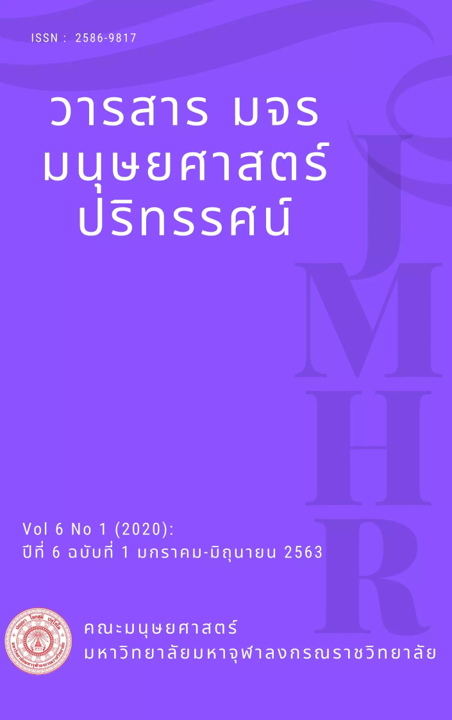การบูรณาการพุทธิปัญญาและปรัชญากุญแจเก้าดอกผ่านการอบรมจริยธรรม ของสถาบันพลังจิต ธรรมะ จักรวาล
คำสำคัญ:
พุทธิปัญญา, กุญแจเก้าดอก, สถาบันพลังจิต ธรรมะ จักรวาลบทคัดย่อ
การบูรณาการศาสตร์ทางด้านจิตวิทยากลุ่มพุทธิปัญญากับหลักปรัชญากุญแจเก้าดอกของสถาบันพลังจิต ธรรมะ จักรวาล ผ่านการอบรมจริยธรรม เป็นกระบวนการเรียนรู้ที่มุ่งเน้นให้ผู้เข้าร่วมอบรมเกิดการเรียนรู้ผ่านกิจกรรม และการใช้ชีวิตอยู่ร่วมกับผู้อื่น ผลจากการเข้าร่วมกิจกรรมทำให้ผู้เข้ารับการอบรมเข้าใจตนเอง และธรรมชาติของผู้อื่นมากขึ้น รวมไปถึงสามารถแก้ไขปัญหาของตนเองผ่านการสำรวจตน และสามารถช่วยเหลือผู้อื่นได้ผ่านการใช้ปรัชญากุญแจเก้าดอกบูรณาการกับศาสตร์ทางจิตวิทยากลุ่มพุทธิปัญญา ซึ่งเป็นอีกหนึ่งองค์ความรู้ที่จะเผยแพร่และเป็นประโยชน์ต่อสังคมส่วนรวม
เอกสารอ้างอิง
พระโกมินทร์ สนฺติกโร (พัฒนศิริ). (2559). การบูรณาการหลักพุทธธรรมในการพัฒนาเยาวชน ศึกษาเฉพาะกรณีพระราชวชิรเมธี, ดร. (วีระ วรปญฺโญ), วารสารบัณฑิตศึกษาปริทรรศน์, 4(2), 2.
พระมหาประสิทธิ์ ญาณปฺปทีโป. (2561). บูรณาการพุทธจิตวิทยาและพุทธิปัญญาเพื่อพัฒนาการคิดแก้ไขปัญหาชีวิตด้วยการเข้าร่วมกิจกรรมคุณธรรม. วารสารพุทธจิตวิทยา, 2(1), 58.
ยุทธศาสตร์ชาติ 20 ปี. (2562). แผนพัฒนาเศรษฐกิจและสังคมแห่งชาติ ฉบับที่ 12 และการปฏิรูปประเทศ, สืบค้นวันที่ 31 มีนาคม, จาก htttps://planning.tu.ac.th/Uploads/planning/pdf/plan/plan20pdf
สถาบันพลังจิต ธรรมะ จักรวาล. (2553). หนังสือรวบรวมการอบรมรุ่น. กรุงเทพฯ : สำนักพิมพ์สถาบันพลังจิต ธรรมะ จักรวาล.
Bandura, A. (1989). Social cognitive theory. In R. Vasta (Ed.), Annals of child developmentVol. 6. Six theories of child development, Greenwich : CT JAI Press.
Schunk, D. H. (2004). Learning Theories an education Perspective (4th Ed.). The University of North Carolina U.S.A., Pearson Education Inc., Publishing as Allyn & Bacon.






